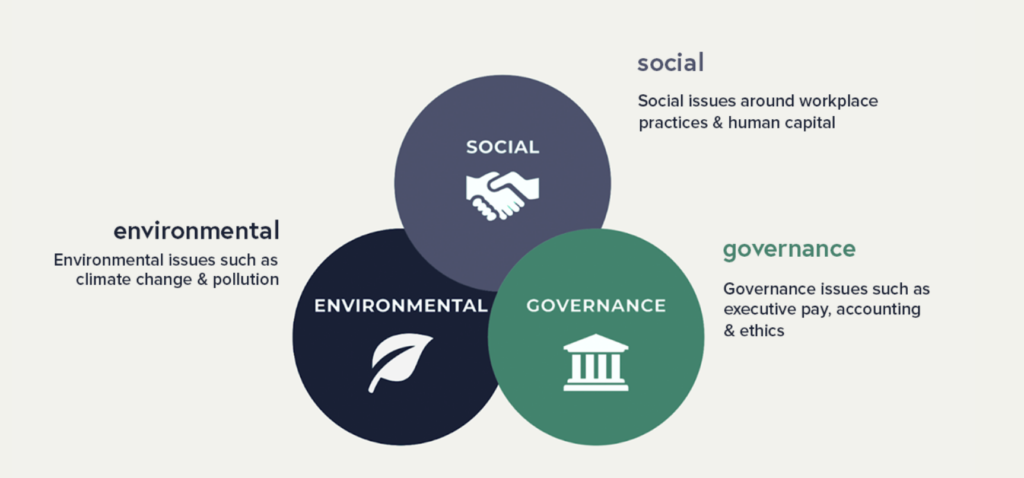
Retirement fund managers regularly consider environmental, social, and governance (ESG) factors in their investment choices, and the socially conscious strategy is getting a lot of attention. In fact, Joe Biden used the first veto of his presidency to support the practice. He rejected a bill that would have prevented retirement fund managers from considering ESG.
But what exactly is ESG, and why is it important to investors?
Demand for information about corporate behavior continues to grow, as more socially conscious consumers and investors seek to align their financial decisions with their personal values. ESG metrics enable companies to measure, track, and report their ethical impact and environmental sustainability. Critics of ESG – including many lawmakers from oil- and gas-producing states – dislike ESG because of its emphasis on promoting social goals like lowering carbon emissions rather than maximizing returns.
However, reporting ESG does more than signal that a company is a good corporate citizen. Investors flock to companies with high ESG scores, because they are more profitable, more sustainable, and better able to manage risk.
Why are DEI and ESG metrics so important now?

Companies with high ESG scores are also more likely to be diverse, culture-centric organizations, because diversity, equity, and inclusion (DEI) practices strengthen and, as we will explain, enhance all three elements of ESG. As consumers, shareholders, and investors become increasingly values-oriented, corporate leaders can’t afford to ignore the double benefits of DEI and ESG.
However, greater interest in ethical investing isn’t the only reason DEI and ESG are becoming more important for corporate executives and boards of directors. The Securities and Exchange Commission and other global regulatory agencies are increasing pressure for companies to disclose DEI information such as board diversity, hiring practices, and pay equity. Sometime in 2023, according to PwC, the SEC is expected to update its workforce – or human capital – disclosure requirements to include more of these nonfinancial metrics.
Organizations that measure their DEI performance – and include that information in their ESG reporting – are able to objectively demonstrate their commitment to ethical business practices. By linking DEI and ESG, culture-centric companies can improve their brand reputation, connect with customers, and attract more investors.
What are some ESG metrics?
Organizations have a great deal of leeway in measuring ESG metrics based on individual preferences and commitments. Each major category of ESG criteria — environmental, social, and governance — covers a wide range of issues that have historically been excluded from investment and purchasing decisions. Some common metrics include:

Environment
These metrics focus on a company’s environmental impact and include greenhouse gas emissions, pollution, water use, and natural resource depletion.
Social
These metrics reflect the way a company engages with its employees and how it impacts the wellbeing of the community. This pillar considers metrics around diversity, employee satisfaction, safety incidents, volunteerism, and taxes.
Governance
These metrics test a company’s commitment to purpose and accountability. Included in this analysis is a standard to measure ethical behavior and risk. Governance factors include board diversity, succession planning, and executive compensation.
How does DEI influence ESG?
DEI should be the foundation for an organization’s ESG strategy, because programs that are established with diversity, equity, and inclusion in mind also increase a company’s sustainability and success.
For example, supplier diversity is a common DEI priority, and companies that diversify their supply chain will see immediate benefits that also align with ESG objectives. Using more locally-based suppliers results in a smaller carbon footprint. Money and talent will remain in the local economy, boosting community wellbeing. Diversifying to include businesses owned by women, veterans, and people of color can also provide capital injection into underserved areas of the supplier market.

The impact of Employee Resource Groups (ERGs), another common DEI program, can also be measured, tracked, and included in social metrics. One study found that 50% of ERG members reported increased job satisfaction and an intent to remain at their job long-term, helping employers lower recruiting costs.
Board diversity, a DEI priority and a frequently reported governance metric, is another powerful indicator of success. Boards with multi-dimensional diversity have been shown to be better equipped to guide their companies through tough times, leading to increased profitability, greater innovation, and lower risk. According to a report from Board Ready, companies with diverse boards were better prepared to survive and thrive during the Covid-19 pandemic.
ESG and DEI drive profits and investment
Companies with a strong ESG focus also tend to be financially successful overall. For instance, software company Salesforce is an industry leader in ESG. The company has already achieved net-zero operational carbon emissions and has even bolder sustainability goals for the future. In addition, they’ve allocated $16 million toward equal pay initiatives and established a racial equality and justice task force.
With a leading market share and a history of producing double-digit shareholder returns, Salesforce is one of the most financially successful and stable companies in the industry. Its revenues continue to grow by the billions year-over-year.
A global study by the CFA Institute found that 85% of investment professionals now take ESG factors into account when investing. According to Gartner, 91% of banks monitor ESG, along with 24 global credit rating agencies, 71% of fixed income investors, and over 90% of insurers.
It’s clear that focusing on ESG and DEI, in addition to traditional measures of financial analysis, is a powerful strategy for long-term success. As competition heats up to attract socially responsible investors, consumers, and employees, these two intertwined strategies will only grow in importance.

Unlike quantifiable metrics like water and energy usage, workforce data can be challenging for companies to collect, measure, and track progress over time. Analytics by The Diversity Movement makes it easy for organizations to measure DEI data across the enterprise and get a holistic view of progress. In addition to collecting information on employee and leadership demographics, TDM Analytics also surveys attitudes and opinions about diversity, equity, belonging, and inclusion. You’ll be able to see at a glance where your efforts have been successful and where you need to improve.
To learn more about DEI, ESG, and how successful organizations use both in their strategic business decisions, look for these articles in our Metrics that Matter series. These and many other resources are in TDM Library:
- Strategic DEI Boosts the Social Impacts in ESG Reporting
- Use ESG and DEI to Create Better Corporate Leadership Teams
- Long-term Environmental Sustainability Depends on DEI and ESG
Amber Keister is a Content Writer and Editor at The Diversity Movement. She has spent more than 20 years as a journalist for publications throughout the South. Connect with her on Linkedin.






